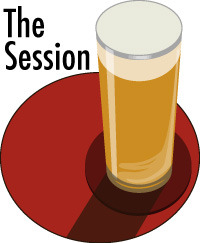 Matthew is hosting this months edititon of The Session and has posed a puzzle that has gotten me thinking, the question of criticism v. critique:
Matthew is hosting this months edititon of The Session and has posed a puzzle that has gotten me thinking, the question of criticism v. critique:
Whereas criticism involves building an argument about why you think something is simply good or bad, critique involves taking a more holistic approach, using carefully researched and considered analysis to build a reasoned, objective, and possibly even entertaining take that benefits readers by giving them good quality information to consider.
My first thought was that I would write about beer writing but I sort of do that every week. But… that question. Eight days ago I wrote that I was trying to work out how this isn’t a distinction without a difference.* Building any good argument always requires considered analysis. Isn’t this just a question of good and poor criticism? I mean isn’t it obvious that all “very good writers… work hard at building a fair critique“? Just because you work done’t mean you succeed every time… or ever for that matter. I am not in a snit, by the way. I understand it’s a good question but I am just trying to get my head around how to answer it.
Hmm… don’t we also have to admit that there is an extra layer to this with beer. Aren’t we, sadly, lumbered with the legacy of Jackson** who wrote, I am told, in 1987:
If I can find something good to say about a beer, I do. Any merit or unusual aspect is, I believe, of interest to my readers. That is why I choose to write about it in the first place … Nor since I have the whole world from which to choose, can I be comprehensive. If I despise a beer, why find room for it? This poses a problem only when a beer is too big to ignore.
The trouble for those who followed his lead is that craft itself got too big to ignore, which led to the leading of lots of people to spend their money buying lots of beer from lots of breweries. Without a filtering friend for guidance, however, because the governing principle was fixed. As a result, too often we’ve had to deal with the hooray for everything approach. Which means not only are bad beers not to be assessed honestly but neither are ill thought out styles or even dodgy breweries. Don’t mention the bad stuff! Schtom!! Because… what… criticism (“booo!“) in good beer is subjective while fawning praise (yay!!!) is objective… apparently?*** But is that all there is? Is there any point going over that all again? It is what it is. So I am not going to write about that. Nope.
Despite that… is there any good critical thinking in beer writing beyond the consulto PR? Why doesn’t good generate much of a body of independent peer reviewed thought, either academic or pop culture? Are there even any great beer writers? Well, there are some I can name just as examples. The Beer Nut has established the stylish standard for considering each beer in itself and calling out poor performers. Katie Mather has raised the bar for writing on the experience of both sides of a pub’s taps. And the works of Martyn as well as the Law of Lars pretty much means you can no longer rehash fable as fact. Yes, there are more than a few glimmers. Which is why I still have an interest in the weekly updates. But… I am not going to write about that. Not. At. All.
Yet… we have an excellent example most excellently provided by the excellent Laura Hadland who (like the kid ahead of me in math class who finished the test early and left the answers in view) posted her submission for The Session earlier this week and, in doing so tied excellence in writing to – err… what to call it – reticence in writing when she recalled her first paid reviewing experience:
…the restaurant got in touch with the paper. It turned out that they were in the midst of a battle with the residents who lived on the same street over the noise and odour produced by their flue over and about those properties. The restaurant accused me of being a plant by this co-op of neighbours and giving them a bad review ‘for the cause’. Which was, of course, utter nonsense, but I later discovered that one of the enthusiastic readers emailing me about my fine review was indeed one of the residents. The whole thing was downright bizarre and quite the furore. It all left a very bad taste in the mouth (and not because of the dodgy food or alleged dodgy flue) but I’m not really sure I learned very much except that you never know when you are going to accidentally stir up a hornet’s nest of local politics.
Exactly. So how, then, can one pick a theme in which to develop a critique when the topic potentially denies and even inhibits the construct of fulsome review itself? (And, while we are at it, why is the meta stuff sucking at the very heart of me this month?) Well, by way of relief, I was sorta struck by this passage on the meaning of fandom in The New York Times this week that offered me perspective:
Thankfully I also believe, in the grander sports-as-metaphor-for-life sort of way, that my Metsian prism on the world is fundamentally the correct one. Which is to say, we’re all losers most of the time. We’re all a little Metsy some of the time. We may have success, yes, but we can’t completely avoid failure and the sooner we embrace it, the happier we’ll be. There’s a reason so many Mets fans, myself included, remain delusionally optimistic after all these years, despite all the horrors we’ve seen and the LOLs we’ve endured. The highs are high, and the lows are low, and no matter how high things get we believe with religious fervor that a new low is just around the corner. But also, right behind that, possibly another high. It’s not a terrible way to go through life.
 I give you Mr. Met. What does Mr. Met do? They win? He smiles! They suck? He smiles! Why? Well, perhaps it’s the paper mache head, sure, but sports fandom sits at the far end of the continuum from ugly local politics. We understand in this sort of fandom that there is the relationship and there is the knowledge – plus I suppose the honesty about the relationship and the knowledge. Can one both offer critique and have the relationship? How far can it go? I think that is actually the problem with beer writing. Writing by fans or for fans or most often both. How else can you explain the obvious but continuing botch of IPA: as tradition, as an appropriated style, as a fragmented set of styles and then a meaningless yet all purpose brand of some sort. Yet it works somehow. Is it really a problem? Is IPA is the equivalent of Mr. Met? Fun and certainly associated but not vital. Frankly, do you really want to dig in deep? When you think of it a bit too much, he’s actually a freakish zoolological and metaphysical horror!! It’s a human with a massive baseball for a head, for God’s sake. Who were his parents? How does he even go to the dentist?? Don’t ask. Just don’t ask.
I give you Mr. Met. What does Mr. Met do? They win? He smiles! They suck? He smiles! Why? Well, perhaps it’s the paper mache head, sure, but sports fandom sits at the far end of the continuum from ugly local politics. We understand in this sort of fandom that there is the relationship and there is the knowledge – plus I suppose the honesty about the relationship and the knowledge. Can one both offer critique and have the relationship? How far can it go? I think that is actually the problem with beer writing. Writing by fans or for fans or most often both. How else can you explain the obvious but continuing botch of IPA: as tradition, as an appropriated style, as a fragmented set of styles and then a meaningless yet all purpose brand of some sort. Yet it works somehow. Is it really a problem? Is IPA is the equivalent of Mr. Met? Fun and certainly associated but not vital. Frankly, do you really want to dig in deep? When you think of it a bit too much, he’s actually a freakish zoolological and metaphysical horror!! It’s a human with a massive baseball for a head, for God’s sake. Who were his parents? How does he even go to the dentist?? Don’t ask. Just don’t ask.
We just sorta like Mr. Met like we sorta like IPA. One could even ask “who would crap on Mr. Met??” Maybe Phillies fans, I suppose. But who needs that? Who craps on IPA? Who needs to if it has become a meaninglessness? We let it go. We set aside the knowledge in favour of the relationship.
So if good beer hasn’t given rise to a body of critique, as Matthew correctly posits, is it perhaps because it isn’t necessary to do so? Believe it or not, from time to time I have some critical thoughts about the beer trade. No, it’s true. And I have also written histories which have sought to untangle fact from myth. But is a point missed when one does that? Or perhaps too much of that? Or only that? Or something like that?****
*A legal phrase found in Canadian rulings, by the way.
**Whose writing, as Churchill said of Russia, was never as strong or as weak as it looked.
***Matther acknowledges this when he wrote: “If beer culture hasn’t matured enough for writers to levy fair, objective critique of culture, products and processes, then I would argue it hasn’t matured at all.” Which may be correct. But I am not writing about that. Even though the “brewer’s intention” stuff drives me bonkers. As if that’s known.
****Finis. Amplifer fluens. (Applause!) Te relinquo.
